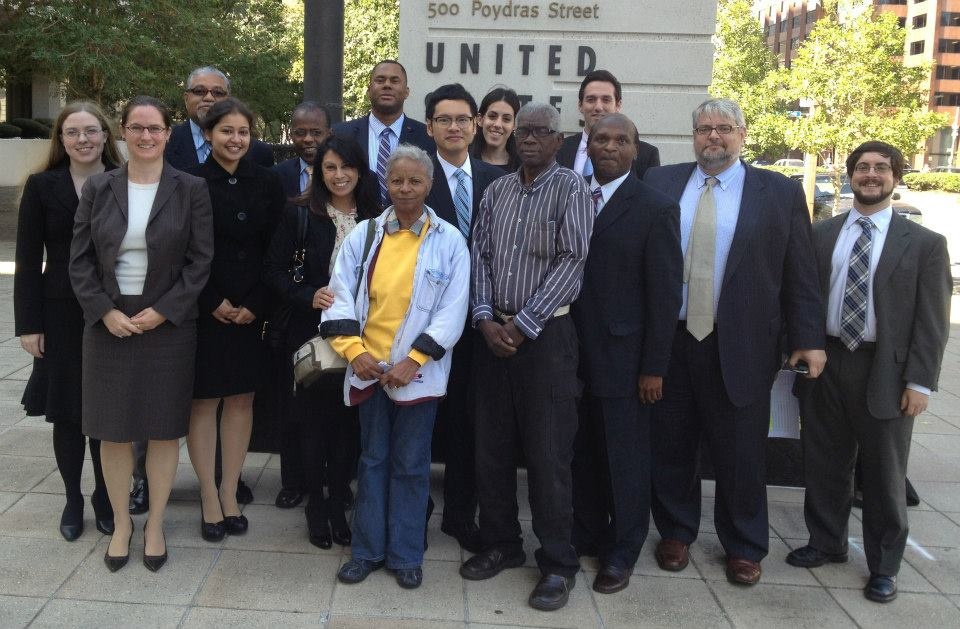Fighting for poor people's access to democracy in Louisiana

What is a state's proper role in expanding access to voter registration for its low-income citizens?
That's the question at the heart of Scott v. Schedler, a Louisiana voting rights case heard this week before the Fifth Circuit Court of Appeals in New Orleans. Since 2011, Louisiana Secretary of State Tom Schedler has been arguing for limiting the state's responsibilities under the National Voter Registration Act of 1993 (NVRA).
Also known as the "Motor Voter Act," the NVRA mandates that all state-run public benefits agencies -- offices that administer food assistance, welfare and health insurance for the poor -- must offer voter registration materials and services to applicants. Louisiana claims that state agencies need to offer this only when people show up in person to apply for benefits but not when they apply by mail, phone or the internet.
Lawyers for NAACP Legal Defense and Educational Fund (LDF) and Project Vote have a different interpretation of the law.
“The vast majority of Louisiana's public assistance clients never step foot in a state office," LDF assistant counsel Dale Ho said in a statement last year. "Louisiana's refusal to enforce the NVRA risks denying tens of thousands of our poorest citizens a clear path to voter registration.”
LDF is representing the Louisiana State Conference of the NAACP and Luther Scott, a man who since Hurricane Katrina has suffered economically, enduring homelessness and needing food aid. But in applying for food stamps, Scott was not offered voter registration materials by state agency staff as required under the law.
A subsequent survey conducted for this case found that personnel at numerous Louisiana public assistance agencies were unfamiliar with their voter registration obligations under NVRA. And a report from the U.S. Election Assistance Commission found that voter registrations from Louisiana public assistance offices plummeted 88 percent since the law was first implemented -- from nearly 75,000 in 1995-1996 to 8,688 in 2007-2008.
Louisiana is not the only state where public assistance agencies have abdicated their voter registration duties: Similar lawsuits have been filed in Indiana, Missouri, Ohio and Pennsylvania.
The NVRA has been unpopular with many conservatives who see it as a partisan reach for Democrats -- even though at the time of its passage Democratic President Bill Clinton was pressing for reforms that restricted welfare benefits. Conservative groups including True the Vote, the Heritage Foundation and Judicial Watch have all fought against the NVRA voter registration mandate.
The lawsuit against Louisiana was filed on April 20, 2011. Subsequent hearings have consistently led to rulings that Louisiana was a chronic violator of NVRA. A judge from the U.S. Eastern District Court of Louisiana wrote in one opinion, “It is evident that the [Secretary of State] has failed to enforce the NVRA in Louisiana. Other than publishing a manual on NVRA compliance and conducting sporadic and faulty training sessions, the SOS has done nothing to ensure that the State comply with its NVRA obligations."
Schedler began cleaning up his state's act shortly after the lawsuit was filed, but Scott's lawyers successfully obtained a permanent injunction from the court to monitor the state and ensure it continues to comply with the letter of the law.
Meanwhile, Louisiana argued this week that the Louisiana NAACP has no standing in the case because the organization itself -- which says it has has expended a tremendous amount of resources helping low-income residents register due to the state’s failure to act -- is not impacted by the violations. But the NAACP’s standing was already established though by U.S. District Court Judge Lance Africk in July 2011. And the Fifth Circuit court itself already agreed that organizations don't need to be personally impacted in every case to have standing in a 1999 suit involving ACORN in Louisiana. In that case the court ruled that ACORN had "expended resources registering voters in low registration areas who would have already been registered if the appellees had complied with the requirement under the NVRA that Louisiana must make voter registration material available at public aid offices."
Louisiana is also challenging the claim that it had to provide voter registration services to all applicants, particularly those who apply through phone or internet. But in a brief filed in May, the NAACP said that such an interpretation would turn NVRA "on its head, requiring public assistance clients to obtain transportation and physically travel to a state office to register to vote -- a result clearly not intended by Congress."
